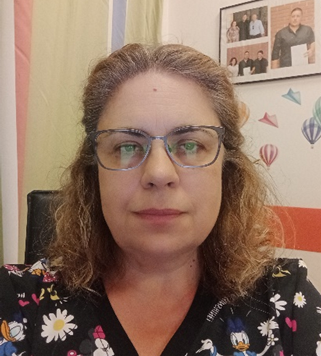-
H-Pass > Blog > Uncategorized > H-PASS Spotlight: A Greek hospital Leader on Digital Change
H-PASS Spotlight: A Greek hospital Leader on Digital Change
Meet Elisavet Giannousi, MD, MSc. As the Head of the Pediatrics Department at the General Hospital of Rethymno, Crete, and a former Medical Director, her experience with the H-PASS pilot training offers a valuable perspective on how essential digital and transversal skills are for leadership, administration, and improving patient care within a constantly evolving health system.

- Pediatrician, MSc (Pediatric hematology and oncology)
- Head of the Pediatrics Department of the General Hospital of Rethymno, Crete, Greece
- Head of the Infection Control Committee of the General Hospital of Rethymno
- Ex Medical Director of the General Hospital of Rethymno
- Chair of the Pancretan Pediatric Society
- Representative of the General Hospital of Rethymno in the eCREAM EHR pilot program for the electronic patient records in the Emergency Department
Here is her personal account of the training experience:
My participation in the H-PASS training program began with an informational email/invitation to participate from the Head of the Greek-language pilot organizing committee, Ms M. Marketou, Associate Professor of Cardiology, UOC, which was forwarded by the Medical Association of Rethymno.
The program seemed interesting to me, with its topics approaching my interests (digitization of patient records, process algorithms, artificial intelligence, human resource management, etc.).
Our hospital had already evolved digitally with the adoption of the PANACEA system and in early 2025 the first working meetings of the eCream program for the digital ED medical record began. During my tenure as Director of Medical Services, I encountered many dysfunctional processes in the health system, with impacts on both patient safety and the occupational “health” of the staff. Thus, I did not have any doubt that the correct use of selected, easy-to-use digital tools can provide solutions to structural and operational problems, especially in conditions of human resource scarcity, where the maximum possible utilization of time and skills is required.
The flexibility of the educational program, with its asynchronous activities and multiple time windows for synchronous activities, also played an important role in my decision, which allowed me to complete it without disrupting my extremely busy work schedule.
The entire educational program was structured in a way that conveyed the information clearly without being tiring, and I believe this is due to the quality of the videos of the asynchronous activities, with the narration being pleasant and not at all monotonous. I also found the links for additional information per topic very useful. However, I believe that the synchronous educational activities presentations, with the instructor’s exceptional communicability and kindness, as well as the ability to interact with colleagues, were the highlights of each educational Module.
Along the trajectory of the training, I discovered ways of thinking and digital tools that I immediately applied in my work, such as process analysis, conflict management, teleconferencing with simultaneous use of work platforms, the use of digital applications for algorithms, task allocation, and patient scheduling.
In my administrative duties I often face difficulties in both change management (applications of the aMed and PANACEA EMR systems) and teamwork-dependent activities (various committees, e.g. spatial planning, infections, quality, etc.). Conflicts in the work environment are frequent and jeopardize the performance of the health unit. Through the lectures, on the one hand I confirmed my beliefs about the role of the leader in change management and on the other hand I formalized the process of creating an efficient work team. The steps I learned about these processes helped me understand the causes of dysfunction and I now follow more structured and efficient practices.
The revelation for me was the way data is managed, something that my generation, with limited digital education, treats superficially and “mechanically”, without knowing in depth how data should be evaluated and, above all, how it is protected. Equally revealing, especially on a personal level, was the concept of digital wellness, and the self-diagnosis test led me to attempt changes in my daily life.
Evaluating my experience from the program, I conclude that it greatly improved my digital knowledge and skills in managing professional challenges and I strongly recommend it to all healthcare professionals. Digital technologies are now intertwined with all activities in the healthcare sector, and inability to adapt to changes with knowledge and security will hinder continuous improvement of the quality of services we provide to our patients.
My recommendations for future training courses are listed below:
– To offer more synchronous activities, because they provide an excellent opportunity for interaction and exchange of new ideas.
– To focus more on groupwork-based exercises, to provide more training in digital collaboration. This, of course, would require all participants to be consciously active in the program.
– There should be more immediate feedback on individual/group assignments, with the possibility of resubmitting an improved version.
– To increase content on: AI and its use by healthcare providers and patients, digital tools in medical education, evaluation of medical publications in terms of data management and possible bias sources / types.
In closing, I would like to warmly thank the University of Crete and the Head of the Educational Programme (Professor M. Marketou) for giving me the opportunity to attend such a remarkable program in the Greek language, and of course the instructor (Mr. Anastasiou), who with his directness, availability for communication, personal kindness and obvious knowledge and love for the subject, helped me discover impressive personal and professional possibilities. For this dedication, he deserves only praise.